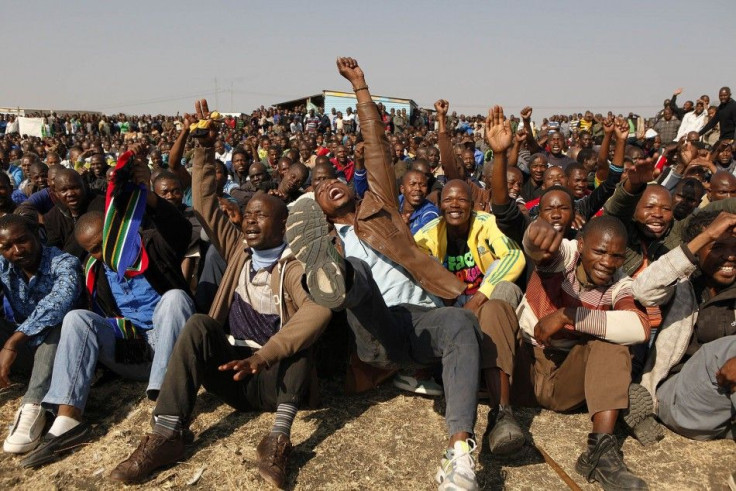South Africa Miner Strike Far From Over As Amplats Fires 12,000

Thousands of miners on strike in South Africa were fired Friday by Anglo American Platinum Ltd. (London: AMS), or Amplats, the world’s largest platinum producer.
The news is a reminder that although the most widely publicized strike of the summer -- the Lonmin PLC (London: LMI) walkout -- has been resolved, the turmoil surrounding South Africa’s platinum industry is far from over.
Amplats executives said a three-week strike at its Rustenburg mine had already cost it about $82 million in revenue, according to BBC News. The company decided to fire about 12,000 workers who did not attend scheduled disciplinary hearings.
Meanwhile, the South African government is keen to prevent more violence. So far, various strikes have erupted in clashes that have killed at least 48 people this summer.
The worst episode came on Aug. 16 at the Marikana mine, which is operated by Lonmin. There, 34 people lost their lives when police fired into a crowd of advancing strikers.
That crisis was eventually resolved on Sept. 18, when Lonmin agreed to a 22 percent raise for its union workers.
But in a sure sign that conflicts are far from over, Amplats strikers at Rustenburg allege that police shot and killed one demonstrator on Thursday. Authorities deny responsibility, and an investigation into the incident has been opened.
In addition, there are plenty of strikes taking place all across the country, across a range of industries. Three gold-bullion producers are currently facing strike-related setbacks, as is at least one iron-ore company.
The roots of this national conflict go much deeper than simple workers’ disputes.
South Africa is the richest country on the continent, but it has one of the world's biggest income gaps. Poverty is widespread, and unemployment is about 25 percent. Mining accounts for about 18 percent of South Africa's gross domestic product, according to the country's Chamber of Mines, but many industry laborers remain destitute.
In addition to securing higher wages, miners on strike have sought to hold the government’s ruling African National Congress Party, or ANC, accountable for its failed policies.
Those aims were echoed on Friday by the ANC Youth League, or ANCYL, a splinter group that does not support ANC President Jacob Zuma. The group responded to the Amplats mass sacking with outrage.
“This action demonstrates the insensibility and insensitivity of the company ... which has made astronomical profits on the blood, sweat, and tears of the very same workers that today the company can just fire with impunity,” the ANCYL was quoted as saying by BBC News.
The group also called Amplats "a representation of white monopoly capital.”
Language like this makes it easy to see why the mining conflict has been compared with South Africa’s apartheid struggles of decades past, when white authority figures responded harshly to black residents’ demands for social equality.
Today, South African society is similarly divided -- not along lines of race, but along lines of wealth and power. The tens of thousands of workers who went on strike this summer have come to represent a disadvantaged sector of society that increasingly refuses to yield.
This is bad news for embattled President Zuma. The strikes and the mass sackings constitute a potentially severe blow to the economy.
The timing couldn’t be worse, as some ANC politicians, including leaders of the ANCYL, are demanding that Zuma step aside in favor of his deputy, Kgalema Molanthe, as noted by BBC News.
But the president appears determined to present an image of stability. In a speech on Thursday, he sought to play down recent worker clashes.
Zuma said that South Africans have shown “the capacity to overcome differences when we work together,” according to Reuters.
"We should not seek to portray ourselves as a nation that is perpetually fighting," Zuma added.
© Copyright IBTimes 2024. All rights reserved.






















